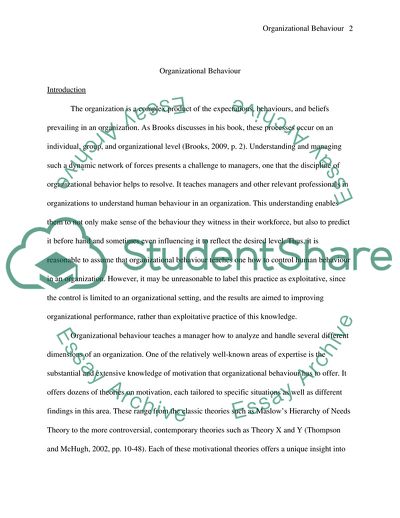Cite this document
(Knowledge of Organisational Behaviour Should Enable to Explain and Coursework Example | Topics and Well Written Essays - 2000 words, n.d.)
Knowledge of Organisational Behaviour Should Enable to Explain and Coursework Example | Topics and Well Written Essays - 2000 words. https://studentshare.org/human-resources/1764472-knowledge-of-organisational-behaviour-should-enable-you-to-explain-and-predict-human-behaviour-in-organisations-and-even-control-it-brooks-20092
Knowledge of Organisational Behaviour Should Enable to Explain and Coursework Example | Topics and Well Written Essays - 2000 words. https://studentshare.org/human-resources/1764472-knowledge-of-organisational-behaviour-should-enable-you-to-explain-and-predict-human-behaviour-in-organisations-and-even-control-it-brooks-20092
(Knowledge of Organisational Behaviour Should Enable to Explain and Coursework Example | Topics and Well Written Essays - 2000 Words)
Knowledge of Organisational Behaviour Should Enable to Explain and Coursework Example | Topics and Well Written Essays - 2000 Words. https://studentshare.org/human-resources/1764472-knowledge-of-organisational-behaviour-should-enable-you-to-explain-and-predict-human-behaviour-in-organisations-and-even-control-it-brooks-20092.
Knowledge of Organisational Behaviour Should Enable to Explain and Coursework Example | Topics and Well Written Essays - 2000 Words. https://studentshare.org/human-resources/1764472-knowledge-of-organisational-behaviour-should-enable-you-to-explain-and-predict-human-behaviour-in-organisations-and-even-control-it-brooks-20092.
“Knowledge of Organisational Behaviour Should Enable to Explain and Coursework Example | Topics and Well Written Essays - 2000 Words”. https://studentshare.org/human-resources/1764472-knowledge-of-organisational-behaviour-should-enable-you-to-explain-and-predict-human-behaviour-in-organisations-and-even-control-it-brooks-20092.


